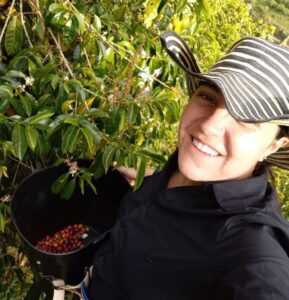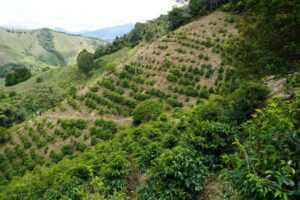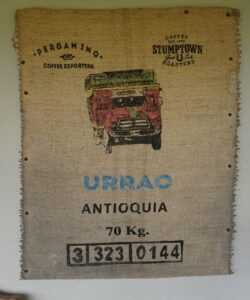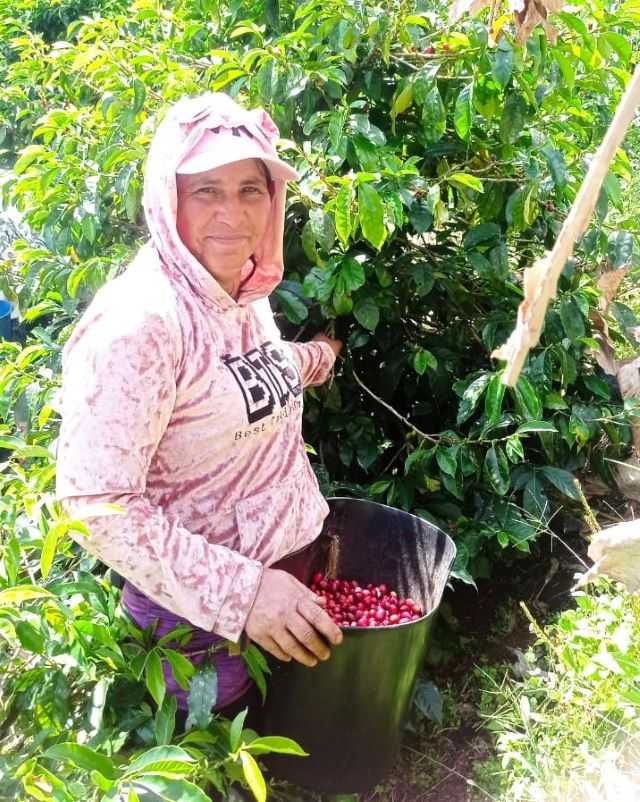MILAN – Pablo López Gallo works in the and MSc. Quality Department REGIO coffee roastery and tea packaging subsidiary of SPAR group in Austria. But his origins start much farther afield: you have to go all the way to Colombia, where he was born and where to this day his family lives and works as coffee farmers on an 18-hectare plantation on 11 hectares of natural forest.
In Santa Catalina, at an altitude between 1900 and 2100 meters, the cultivation of 6 varieties (Bourbon red, yellow and pepper. Caturra. Tipica. Chiroso) takes place through the constant effort of 5 employees, 2 of them permanent.
Pablo’s father, Hector, and his sister, Susanna, have been pursuing specialty coffee in the field for about a year now, literally, beyond just the raw material, toward a finca concept that is both design and cultural.
Here we report the first part of the long interview that closely explores the world at the origins of green.
How long have you been running your farm and how have things changed to date for farmers in your area?
Susanna has entered the incredible world of coffee through the Federation of Cafeteros within which for the past 4 years ” I have been involved in providing technical service, to the farmer in the municipality of Antiopia Urrao and Concordia.”

Susanna: ” Urrao has more or less 1200 caficultores and we are in contact with 600 of them. That is a lot to visit for one person who wants to get in touch with this world. In Concordia there are about 2,000 caficultores and 300 farming families.
I soon became aware of the need and vulnerability of the caficultores: each one has different needs that they would like to be heard and because of that, giving them assistance is not easy. I have to find a compromise between helping and listening to their stories as best I can and providing them with the tools and recognition to be able to value their coffee, sell larger quantities at a higher price.
That is what I think I can do so far. It has not been easy because being a young woman, it is a challenge to be considered, no one initially gave me credit. Then things slowly changed: now we have reached the point where fathers and mothers of families put me forward as an example for their children to follow who can ask me
anything. As a woman, it feels a little lonely, but on the other hand, I have become a reference point for others, for other women who work in the field and thus feel that they can have a future in this field. To have a professional destiny outside the home, dedicating themselves to cultivation.
In addition, in Colombia, the dynamics of producer families are many: they are not just the classic ones made up of mom, dad and children, but there are men and women who work individually, or children who are learning how to take the farm forward. I represent an ally for the farm wives who are running the production. So being a woman, on the one hand it was an obstacle for me in the beginning, but on the other hand it translated as an opportunity.
You have to make a lot of compromises. There is a lot to do and to learn. Now we are working on a second project in Urrao with the Federation that is of a more technical nature, where we want to build a bigger finca and then turn it into a business. We have presented it to the community as a possible example to work together with the municipal action council (a group that meets to establish the same practices to improve production). In the same area, we explained that one cannot limit oneself to being a small farmer, because people in Urrao still have the mentality of maintaining small size.

With this finca model we want to try to break this paradigm, and communicate the message that you can be a producer with a few more trees. Coffee in Colombia often has little market because there are not enough quantities to pack and ship. With this venture, we obtained organic certification for a group of 30 caficultores at a site where they were working in a traditional way, so we were faced with several doubts about what could be
done and whether it could work: they finally got this certification, involving a large group of
people. During this process, my own family came to coffee, thanks to my mediation.
Before, we only drank second-grade coffee, because the higher-grade coffee is sold. So we started getting involved in production. Just when my family realized they could make money from coffee and that we are talking about a product that is more of a life project and not just a commodity, Pablo entered the coffee business in Austria-it is in our family destiny. We have been running our own coffee finca for a year now, together with my father.”
Hector: “By the cases of life, we implemented this project. An opportunity arose to buy land, and precisely after a year the business we worked in before for 20 years, closed down. This finca therefore for us is like a gift from God. We are in Urrao, a municipality that is very well known for violence, with a reputation for having this problem. The peasants here have suffered, being subjected to the armed group for years and have been pushed out of the fields.
Now, however, the community has been reborn, and people are more involved, returning to work on their land. We have been well received by the local people. We can leave the house unattended without anything happening, and indeed, people share a lot with their neighbors: a plantain, milk, fruit, arepaz. We prepare a common dish to share with everyone: there is more unity and we are very cohesive. ”
Being part of a cooperative, what advantages does it give you?
“Yes totally. I am a great supporter of the principle of cooperativism, because acting alone is more difficult. When one associates, one can count on the maximum human resources and can express to the best of one’s ability.
I am in favor of this shared work whereby it is possible to teach, to learn, and in this case I myself can testify to how relevant the role of women is in all phases of agriculture, for example even participating in the creation of the new cooperative that is being formed around specialty coffees here in Urrao. I am the only woman who is participating in this elected council.
Cooperativism is an opportunity, as long as the goals are clear for the benefit of society.”
Is Colombian coffee production currently experiencing a bit of a renaissance driven by specialty?
“I believe that specialty can represent a renaissance for Colombian coffee, which has potential yet to be fully exploited. In two respects: in Colombia there are many areas where the climatic conditions allow the production of an aromatically complex and therefore high-scoring coffee; on the other hand, I see that the same market is moving toward a cleaner cup, and we can also achieve this with different processes of washes and fermentations and raise the price for these coffees sold to achieve a common goal.

The problem now is that not all the world has access to the information and knowledge needed to grow these products-many do not even know they have specialties. In Urrao, out of 1200 producer families, 50 percent cannot even read. So we can only talk about a renaissance for those who can access tools and skills to develop. Some producers do not have an efficient network that can lead to the marketing of their raw material as a specialty. Having the potential is not enough in the face of this context.
We need to think about these people who remain isolated. To change the situation, the key is to have direct contact with farmers, and to be able to do that, you need to find a person to act as a bridge between a family in the places of origin and marketing. I myself could represent this figure, a conduit to tell them that this coffee is better and that is why it can be sold more easily to interesting customers.
We need to teach what specialty coffee is, with more suitable farming practices through
an accompanying path also through collaboration with cooperatives. So people will understand, they will delve into the subject as they go: but always it takes a person who first of all conveys the correct information.”










